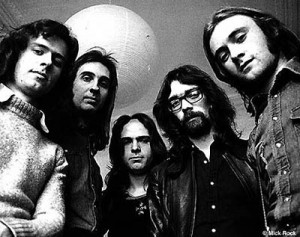Where did it come from?
Ignoring “Day by Day” (from the Godspell movie soundtrack; #13 on the Hot 100—and, yes, let us please ignore it in perpetuity), 1972 was hardly a high water mark of religious themes in pop music. And as fellow EPBer Mark Hjelm suggests, “Supper’s Ready” does not appear to have sprung from any deeply held personal beliefs of its authors.
Perhaps it was there from the beginning, in the band’s very DNA. Perhaps it was the simple fulfillment of logic that a band called Genesis, whose first album was titled From Genesis to Revelation, would one day address religious themes in its work.
The questions lead back to Charterhouse, the English public where the group’s core members met. God may be everywhere, but English public (read: private) schools do not seem to be particularly fertile gardens for the Word—no more so, anyway, than American prep school counterparts. However, unlike Choate or Phillips Exeter, where noncompulsory chapels seem to have survived as vestiges of 19th-century ideas of what constituted a gentleman, Charterhouse still holds thrice weekly whole-school chapels today. The Anglican church carries a cultural heft in Britain that no US denomination can match. Sit a bunch of bright boys down in the pews three times a week, and images, stories, and music will begin to sink in, regardless of doctrine or personal belief.
 So if one of those boys is in a band and plays keyboards, its is only natural that he adds organ and mellotron choirs to his palette. It’s part of his cultural birthright (see “Jerusalem,” ELP, 1973). Sonically, the group could turn any club into a chapel and, eventually (especially when Mike Rutherford added his Dewtron “Mister Bassman” and later Moog Taurus bass pedals), any stadium into a cathedral. And when that band reaches the point of creating a composition that was to fill one whole side of an LP, they reason that churchy themes may carry the freight better than another meditation on spaceships or nursery rhymes or Hobbity things. Genesis understood a work with Biblical imagery and apocalyptic themes could take their audience places, and could achieve a grandeur, that songs on other themes could not.
So if one of those boys is in a band and plays keyboards, its is only natural that he adds organ and mellotron choirs to his palette. It’s part of his cultural birthright (see “Jerusalem,” ELP, 1973). Sonically, the group could turn any club into a chapel and, eventually (especially when Mike Rutherford added his Dewtron “Mister Bassman” and later Moog Taurus bass pedals), any stadium into a cathedral. And when that band reaches the point of creating a composition that was to fill one whole side of an LP, they reason that churchy themes may carry the freight better than another meditation on spaceships or nursery rhymes or Hobbity things. Genesis understood a work with Biblical imagery and apocalyptic themes could take their audience places, and could achieve a grandeur, that songs on other themes could not.
Did they believe it? Critic Terry Teachout has a keen take on the question as it relates to another British composer. Ralph Vaughn-Williams “saw the writing of sacred music as central to his mission as an English composer,” says Teachout. “How are we to reconcile [this] … with the fact that its maker lacked the gift of faith?” While Gabriel and company did not approach their work with the same sense of responsibility as Vaughn Williams—or Elgar, or Holst, or Britten, or any other British composers of deep faith or none at all–all were products of a culture in which sacred music was prevalent. Teachout ultimately argues that it doesn’t matter whether or not they believed it: The artist’s job is not to believe himself but to make you believe.
– Tom Fredrickson is the proprietor of the unparalleled music blog, Lost Wax Method.
[The Genesis album, Foxtrot, which included the memorable 20 plus minute song, “Supper’s Ready” was released October 6, 1972. Thus, on or around the 40th Anniversary— Oct. 6, 2012– East Portland Blog is saluting the band, the album and the song and asks you to join with us in celebrating this auspicious occasion by sharing your comments below.]
http://youtu.be/M58wE8GTGp4



